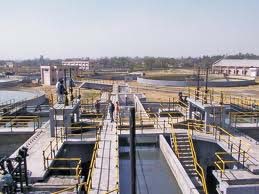Urban Water
Revised guidelines for the centrally sponsored scheme of Common Effluent Treatment Plants (CETPs) - Ministry of Environment & Forests, 2011
Posted on 25 Sep, 2011 06:03 PM
Image courtesy: www.projectsmonitor.com
Under the Water (Prevention and Control of Pollution) Act, 1974, every industry has to provide adequate treatment of its effluents before disposal, irrespective of whether it is in stream, land, sewerage system of sea. The small scale industrial units (SSI), which are presently defined as units whose plant and machinery are valued at less than Rs. 5 crore occupy an important place in the country's economy. The SSIs are a major contributor to the total industrial pollution load of the country. However, only a small fraction of the effluent discharge from these units is estimated to be treated as on date.
Evaluation of Central Pollution Control Board (CPCB) – A report by Indian Institute of Management Lucknow
Posted on 25 Sep, 2011 02:41 PMThis evaluation report by the Indian Institute of Management (Lucknow) of the Central Pollution Control Board (CPCB), a central institution established to set environmental standards for all parts of the country focuses on strengthening of CPCB and its preparedness to undertake various measures as suggested by environmental statutes.
Reap what you sow, eat what you grow A film by Suma Josson on urban community farms promoted by Urban Leaves in Mumbai
Posted on 24 Sep, 2011 06:21 PMReap what you sow, eat what you grow - A film by Suma Josson
It depicts how applying ecological principles and practices to maintain soil fertility, to manage crop health, and to keep soil and water in a good condition is especially relevant to the urban setting. The film focuses on the work being done in the urban farms, yet it can be seen as much more than that and, understood as a vision on healthy products, healthy production systems and as a way of life.
Water for Indian cities - Government practices and policy concerns - Issue Brief - Observer Research Foundation
Posted on 24 Sep, 2011 04:50 PMThe urban expansion in India has not been met by a similar expansion in infrastructure and basic services. This has severely affected the quality of urban life and economic growth.
The war over blue gold
Posted on 19 Sep, 2011 04:45 PM"Per capita water availability to reduce by 2025", says Droplets: e-Newsletter from Everything About Water - August 2011
Posted on 17 Sep, 2011 06:18 PMArticle and Image Courtesy: Everything About Water
Highlights from the August edition of Droplets e-newsletter published by the Everything About Water
- India: Per capita water availability to reduce by 2025
- WHO: New guidelines for safer drinking water supply systems
Water and sanitation challenges and the urban poor - Report of the consultation workshop held in December 2010 by India Wash Forum
Posted on 11 Sep, 2011 02:03 PM
On December 22, 2010, India WASH Forum organised a one day consultation workshop on pro poor urban water and sanitation at India Habitat Centre, New Delhi. India WASH Forum is a coalition bringing together interested stakeholders in the water and sanitation sector in the country.
Decentralized wastewater management – An overview of a community initiatives in New Delhi - Vigyan Vijay Foundation
Posted on 05 Sep, 2011 11:40 AMThis paper by Ajit Seshadri, Vigyan Vijay Foundation highlights the poor sanitation situation in India and argues that centralized approaches to wastewater treatment have had limited success and there is a need to make wastwater treatment people centric and effective through the use of decentralized systems such as DEWATS (Decentralized Wastewater Treatment Systems). DEWATS are locally organized and people driven systems that typically comprise a settler, anaerobic baffled tanks, filter beds of gravel and sand, and an open pond. The open pond or the polishing tank recreates a living environment for the wastewater to clean itself, naturally.
Communal toilets in urban poverty pockets - A WaterAid report
Posted on 02 Sep, 2011 12:39 PMThis report published by WaterAid describes the findings of the study conducted in seven poverty pockets in Bhopal to look at patterns of use of communal latrine facilities. Much has been invested in building communal and public toilets and more resources are likely to continue to support this form of sanitation in dense urban areas in India.
However, there is no evidence available that is needed to quantify their potential contribution to reducing open defecation and faecal pollution in these environments, and identify those design features and management factors that encourage the highest usage rates by all household members. Also there is no information available on the impact of age and gender related differences in patterns of use.
Groundwater, self-supply and poor urban dwellers - A review with case studies of Bangalore and Lusaka by IIED
Posted on 24 Aug, 2011 08:32 PMIt investigates the difficulties they face and emphasizes the need for better integration of groundwater in the planning and management of urban water resources.



